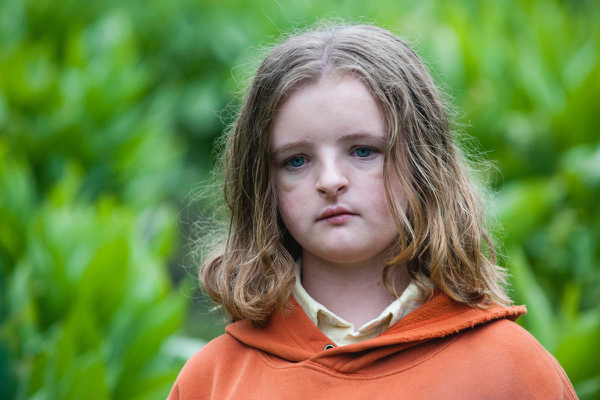Movie review by Greg Carlson
Scaring up early buzz as a premiere in the Midnight section of the 2018 Sundance Film Festival, Ari Aster’s “Hereditary” is the horror film of the year. Anchored by the vital performance of Toni Collette as grieving, disintegrating mother Annie Graham — arguably the actor’s career-best work — the movie’s other noteworthy MVP may just be Pawel Pogorzelski’s sharp cinematography, which features one breathtaking day/night cut so perfect it serves as a reminder that not even the bright sun can ward off the inevitable. Aster, making his feature film debut as writer-director, assembles “Hereditary” with the confidence of a clockmaker, his gifts reflected in the dollhouse designs of both the scale miniatures by Steve Newburn and the life-size environment of the hell house inhabited by the Graham family.
The movie opens with the brief obituary of Ellen Leigh, the mother of Annie. At the funeral, Annie indicates some surprise at the large number of mourners, citing Ellen’s intense secrecy, her difficultness, and her suspicious nature. It’s an early tip-off that Ellen’s fierce sense of personal privacy veiled some awful secrets, and Aster relishes his opportunity to tease out the precise manifestation of family skeletons in the closet. The most devoted genre fans may be able to predict the film’s trajectory with some accuracy, but many viewers will be confronted with disequilibrium designed for maximum anxiety, especially as Aster punctuates the action with some well-timed bombshells.
“Hereditary” maximizes the one-two punch of what several observers have referred to as “slow horror” or “slow burn horror,” which eschews the jump scare and the emphasis on gore in favor of a kind of psychologically-oriented accretion of dread. Aster also supplies bold structural feints, powered in part by the deceptive brilliance of A24’s sensational trailer and marketing. Not everyone has been completely won over by the film’s so-called “art house” factor, however, and some intelligent explorations of the pros and cons of the filmmaker’s technique can be found online for anyone interested in a very deep dive.
Horror aficionados have embraced Aster’s meticulous attention to detail, ringing up comparisons to everything from “Rosemary’s Baby” and “The Shining” to “The Babadook” and “The Witch.” Aster himself reminds viewers that plenty of inspiration was mined from less obvious sources. He has cited “Cries and Whispers,” “Don’t Look Now,” “Ordinary People,” “In the Bedroom,” and several other titles as important texts informing various aspects of “Hereditary.” The cinema-literate filmmaker’s focus on sturdy examples of wrenching family melodrama makes perfect sense as the subtextual concerns of “Hereditary” break through to the surface.
While many fingers remain crossed that Aster will prepare an audio commentary for the eventual home release of “Hereditary,” the devoted must currently settle for multiple viewings and spirited discussions. Whether or not the movie will become a canonized horror classic can’t truly be known for some years, of course, but “Hereditary” certainly has a shot. The film’s minor drawbacks, which count the tip-off casting of Ann Dowd (nothing wrong with the work itself) are outnumbered by the strengths. Principal among them is the respect with which Aster works both the demonic/supernatural angles and the heartbreaking metaphors of serious mental illness straining to unravel a family.
